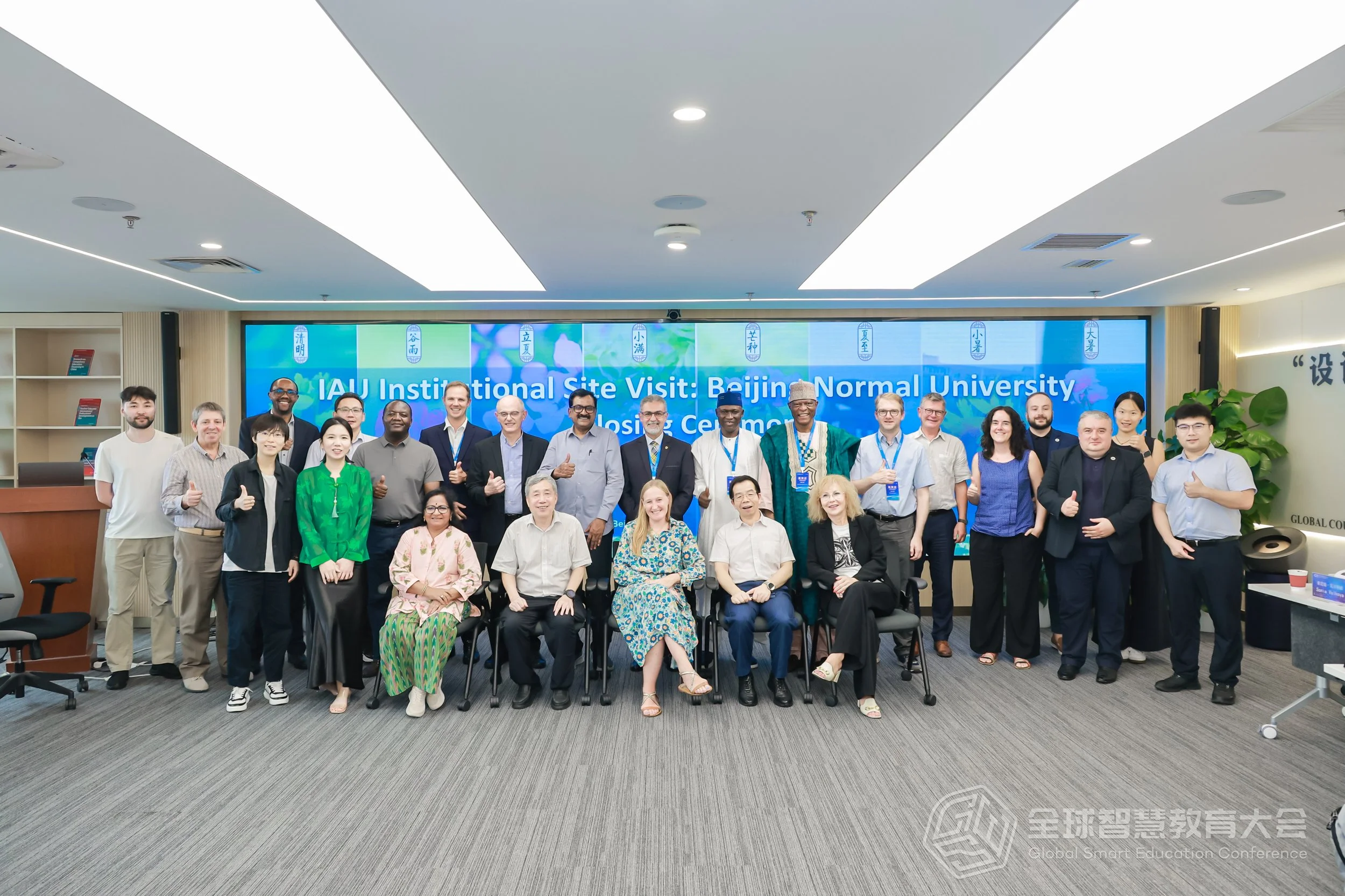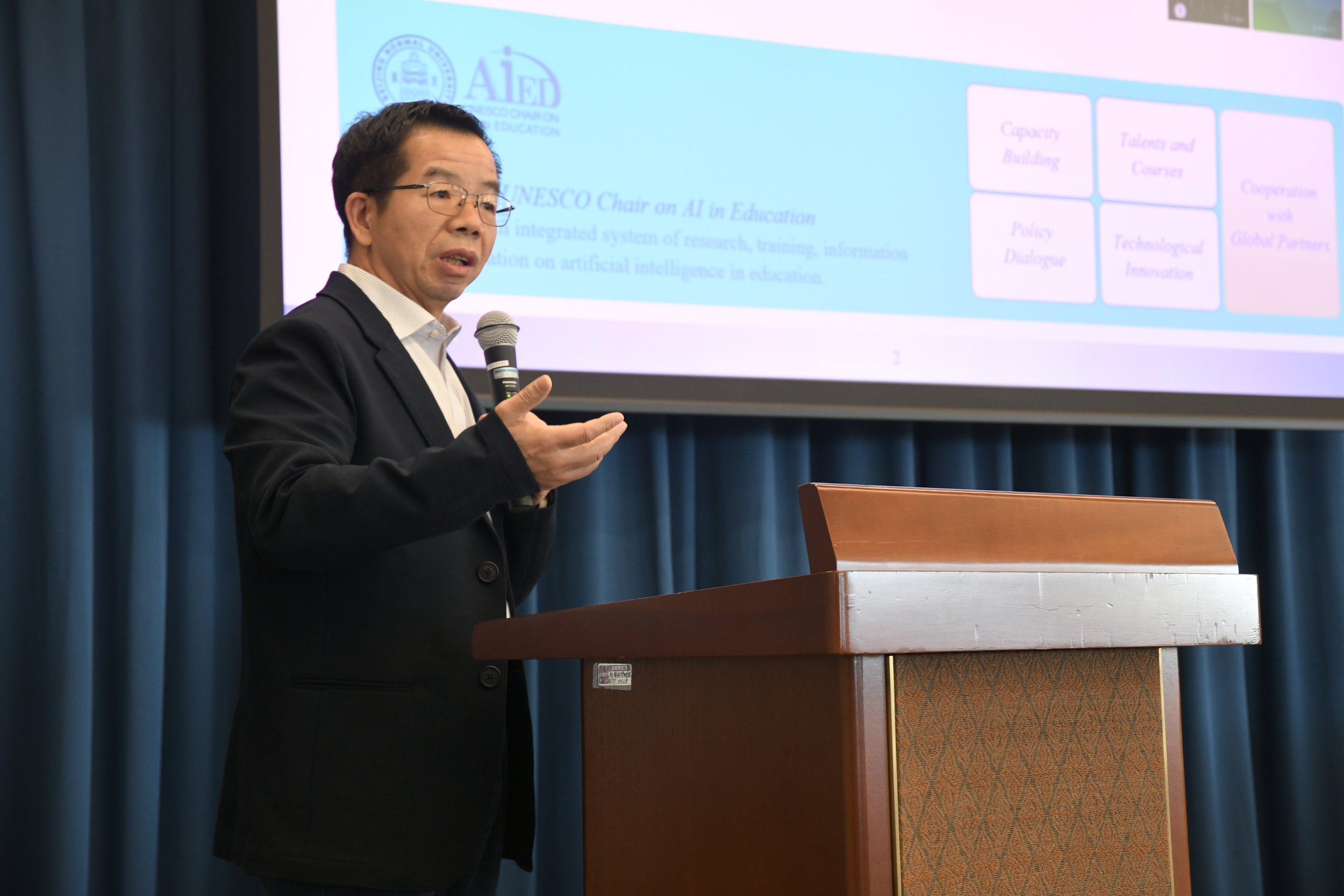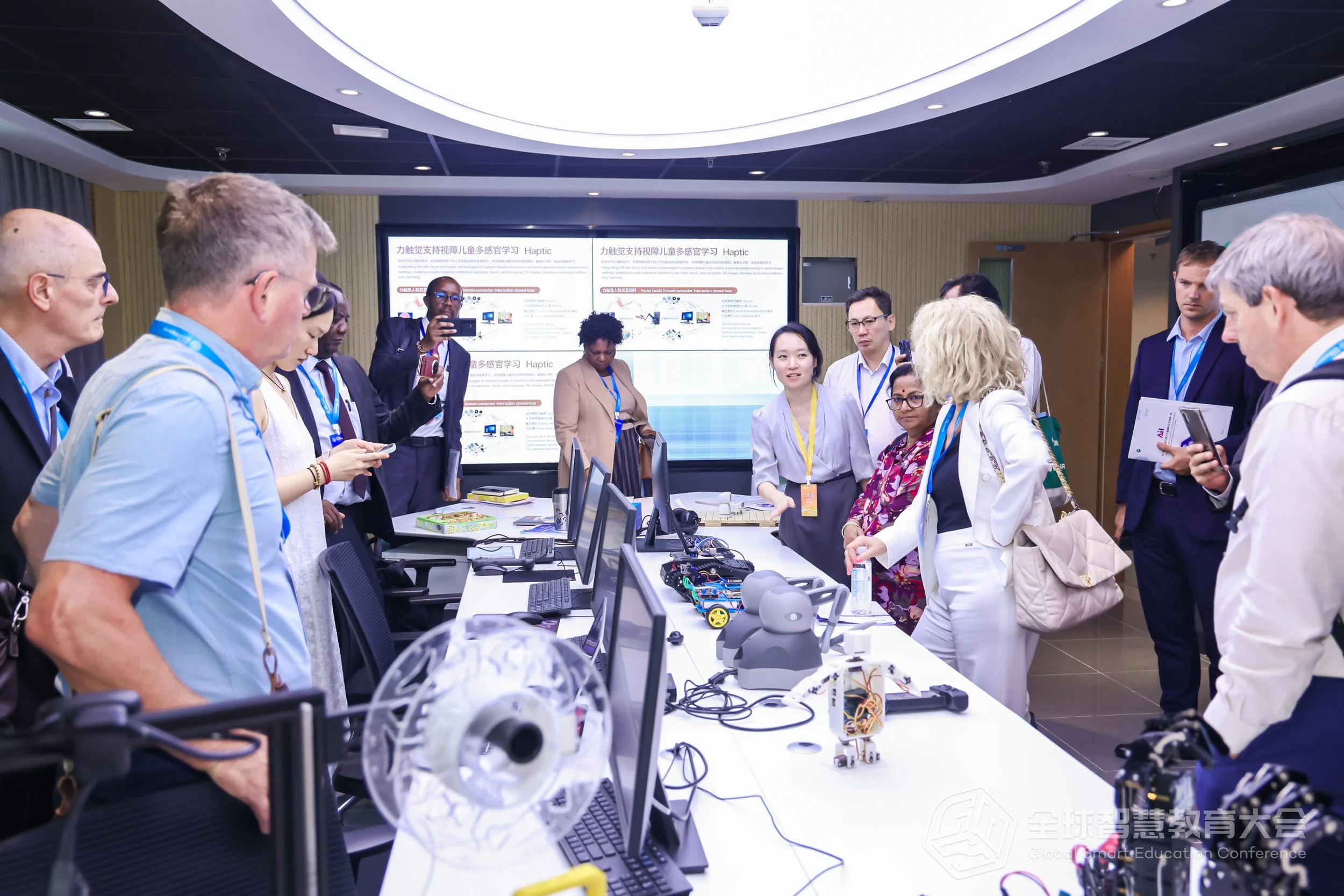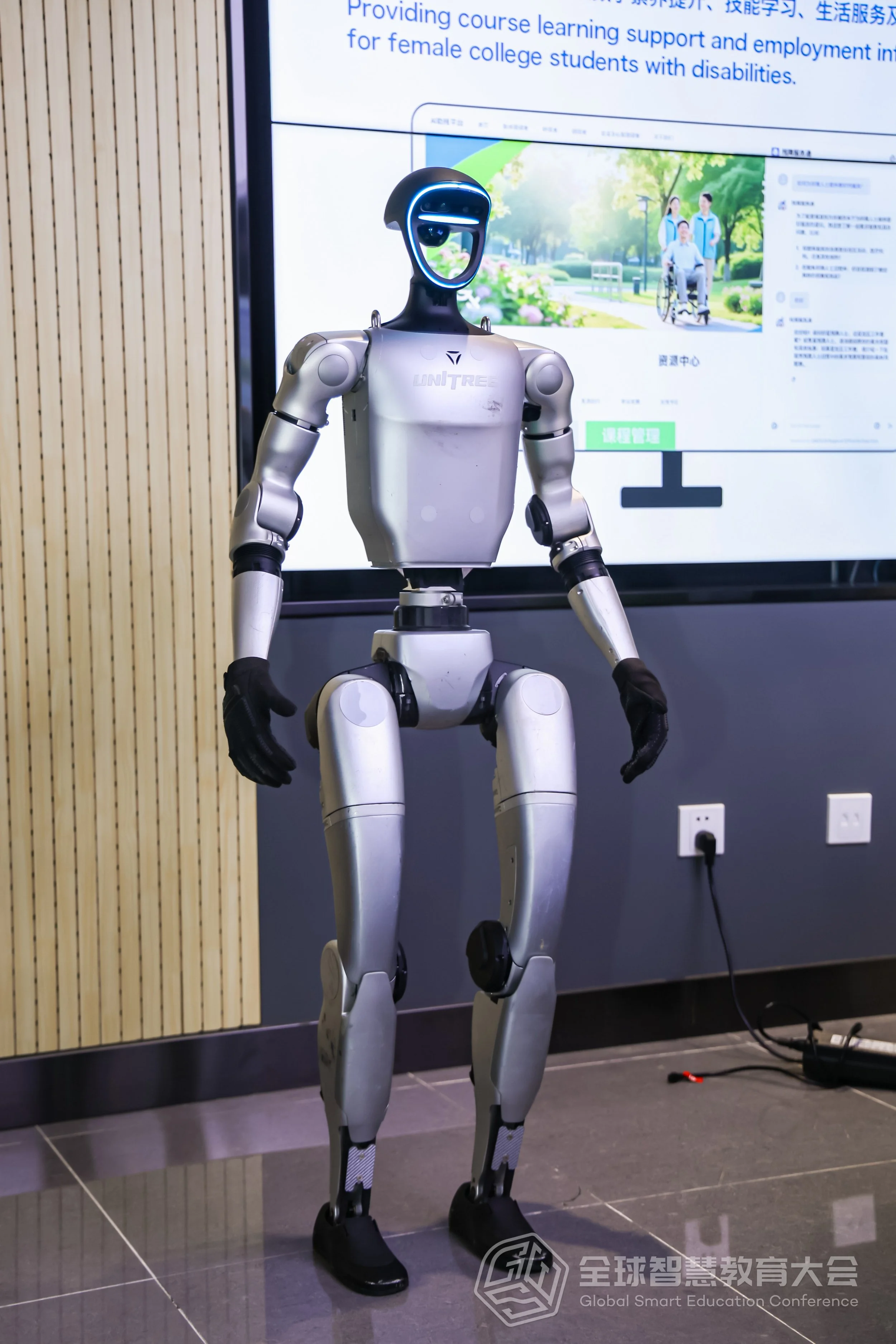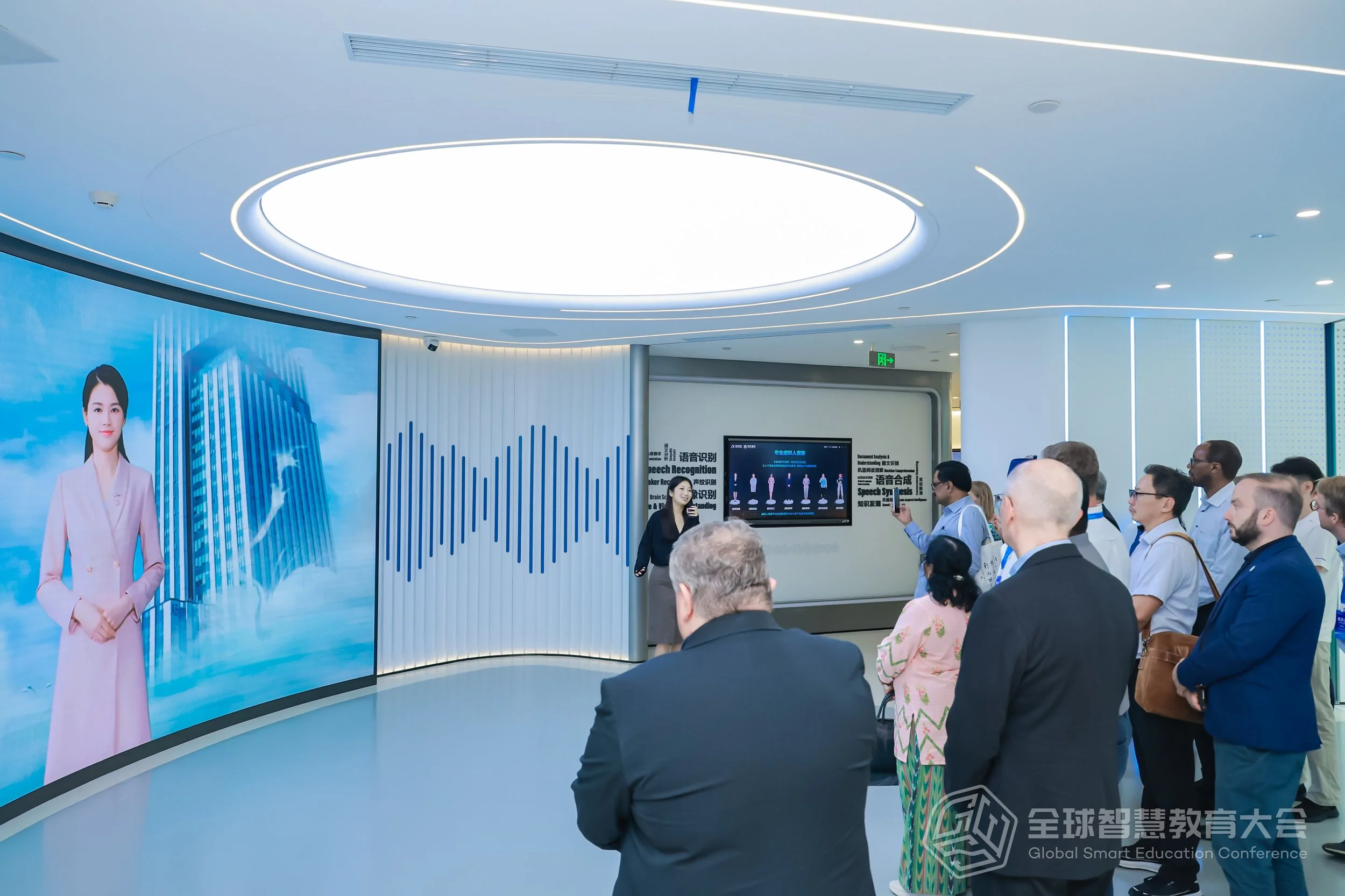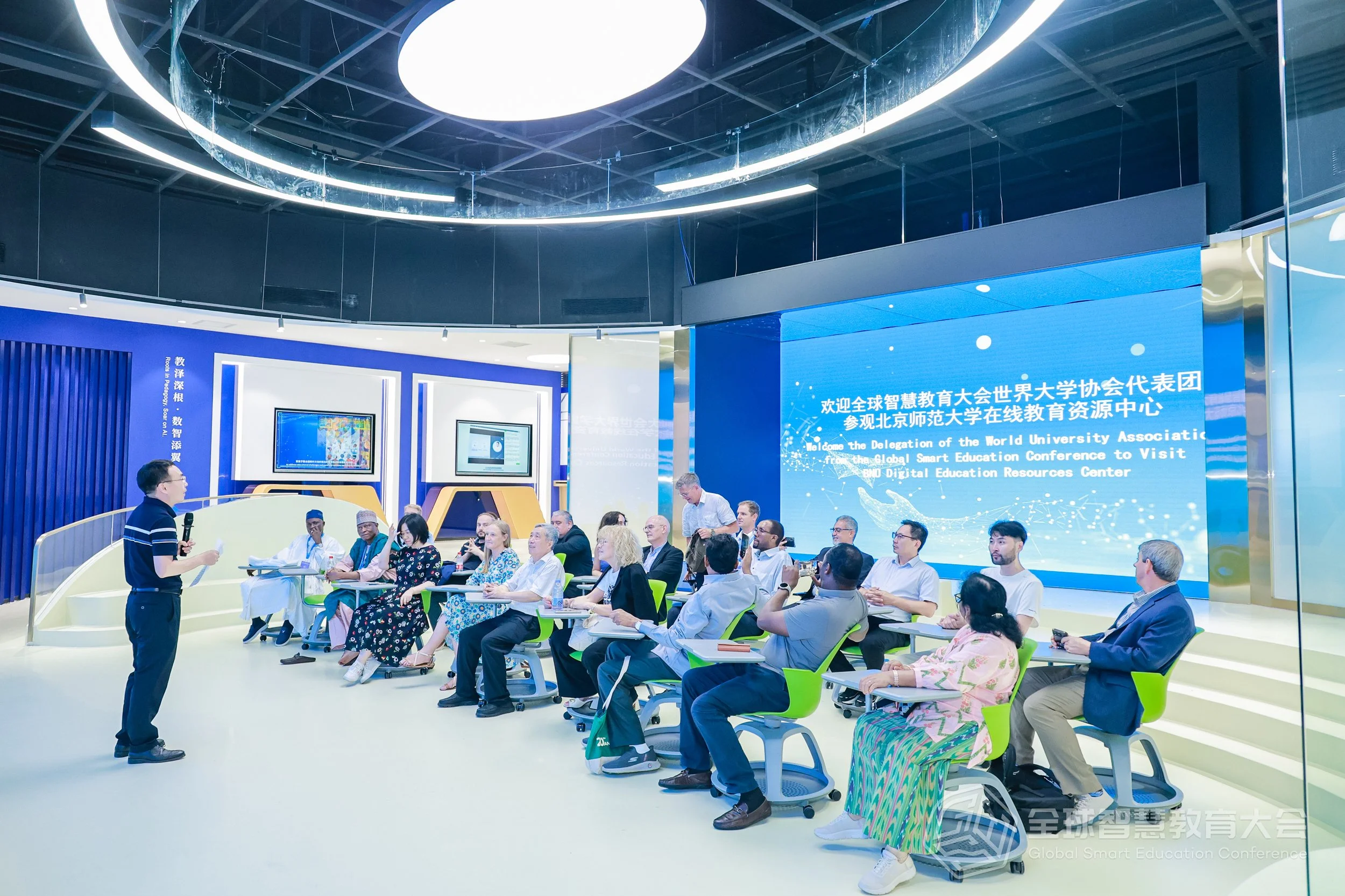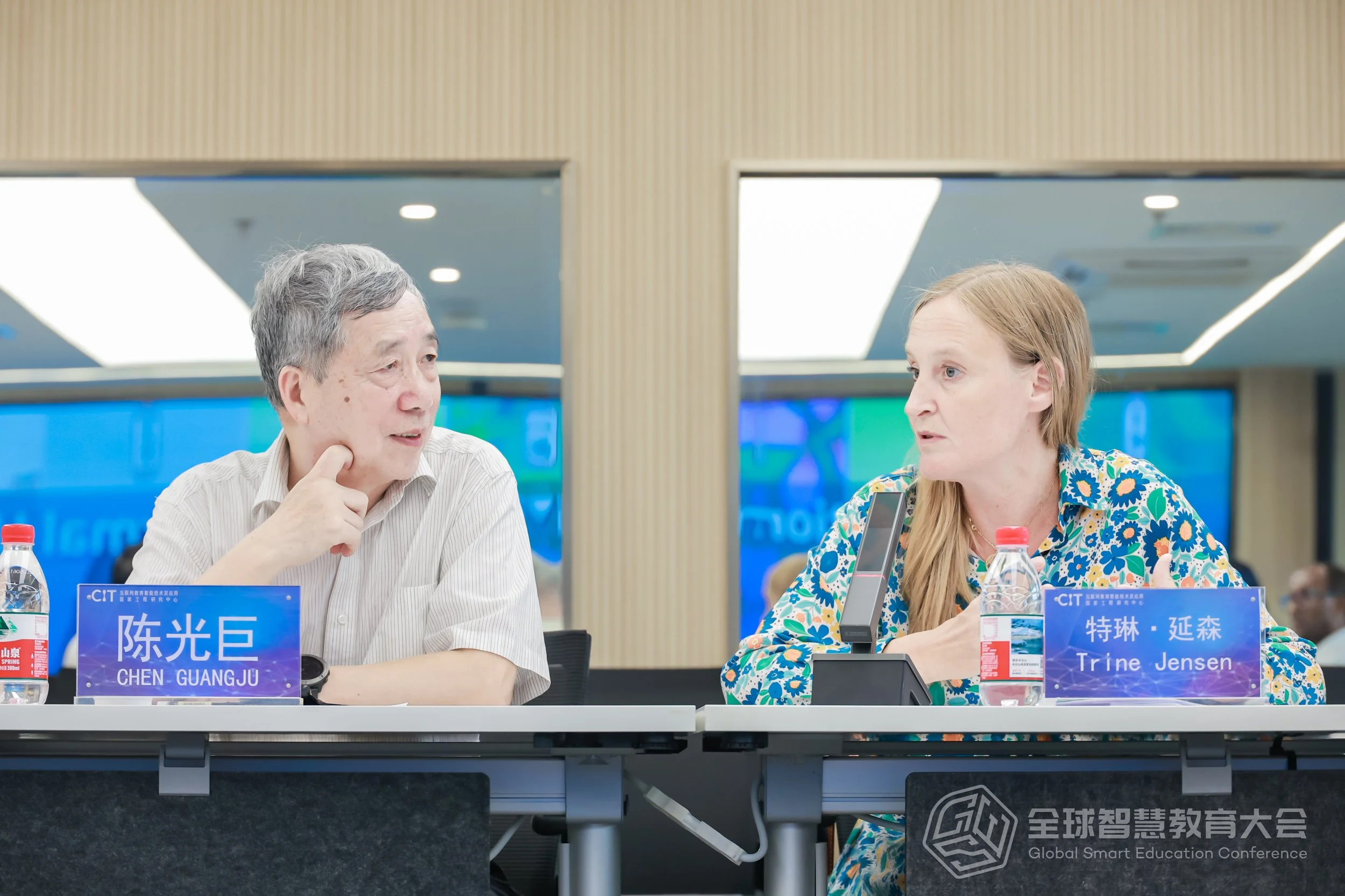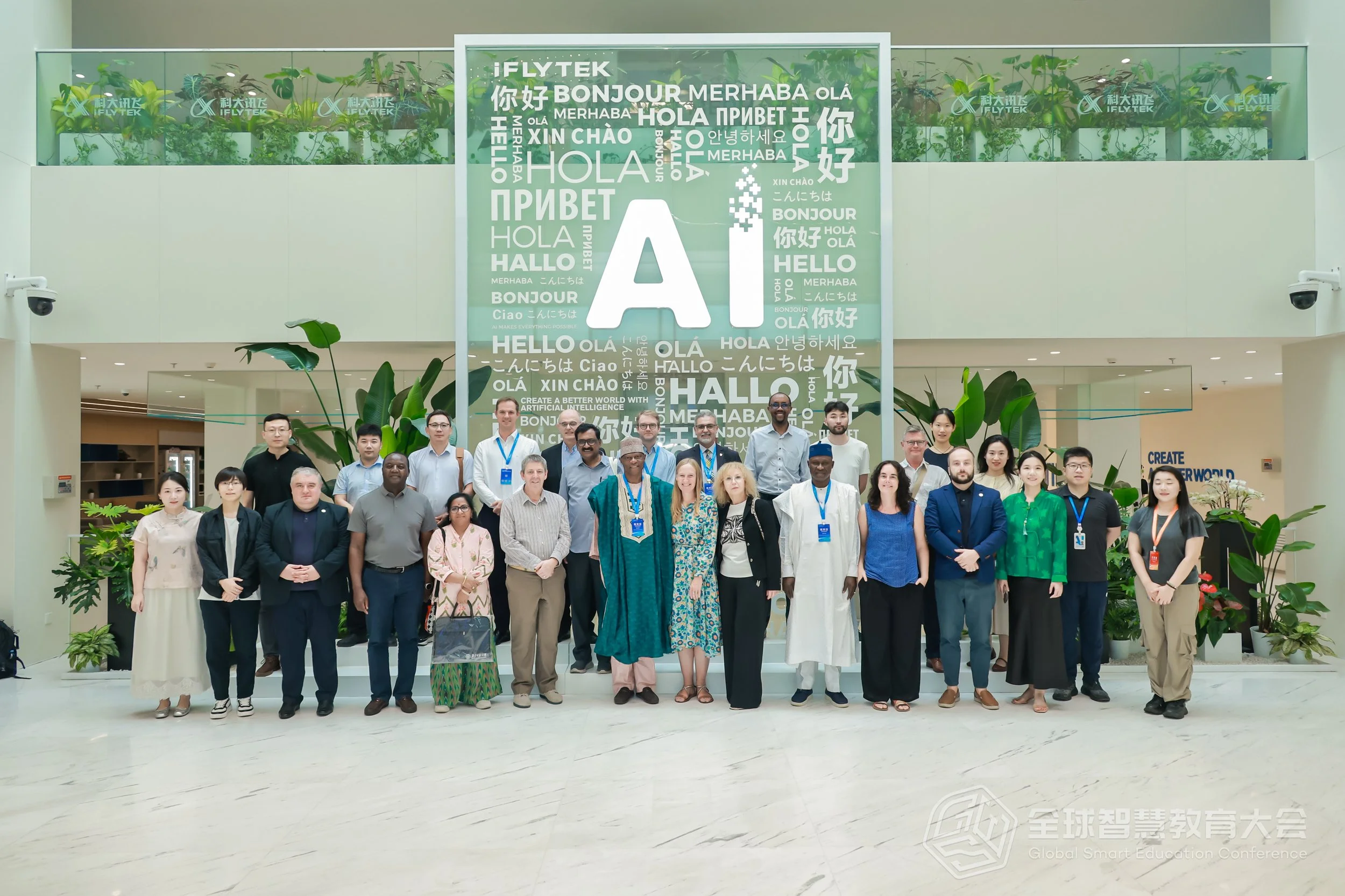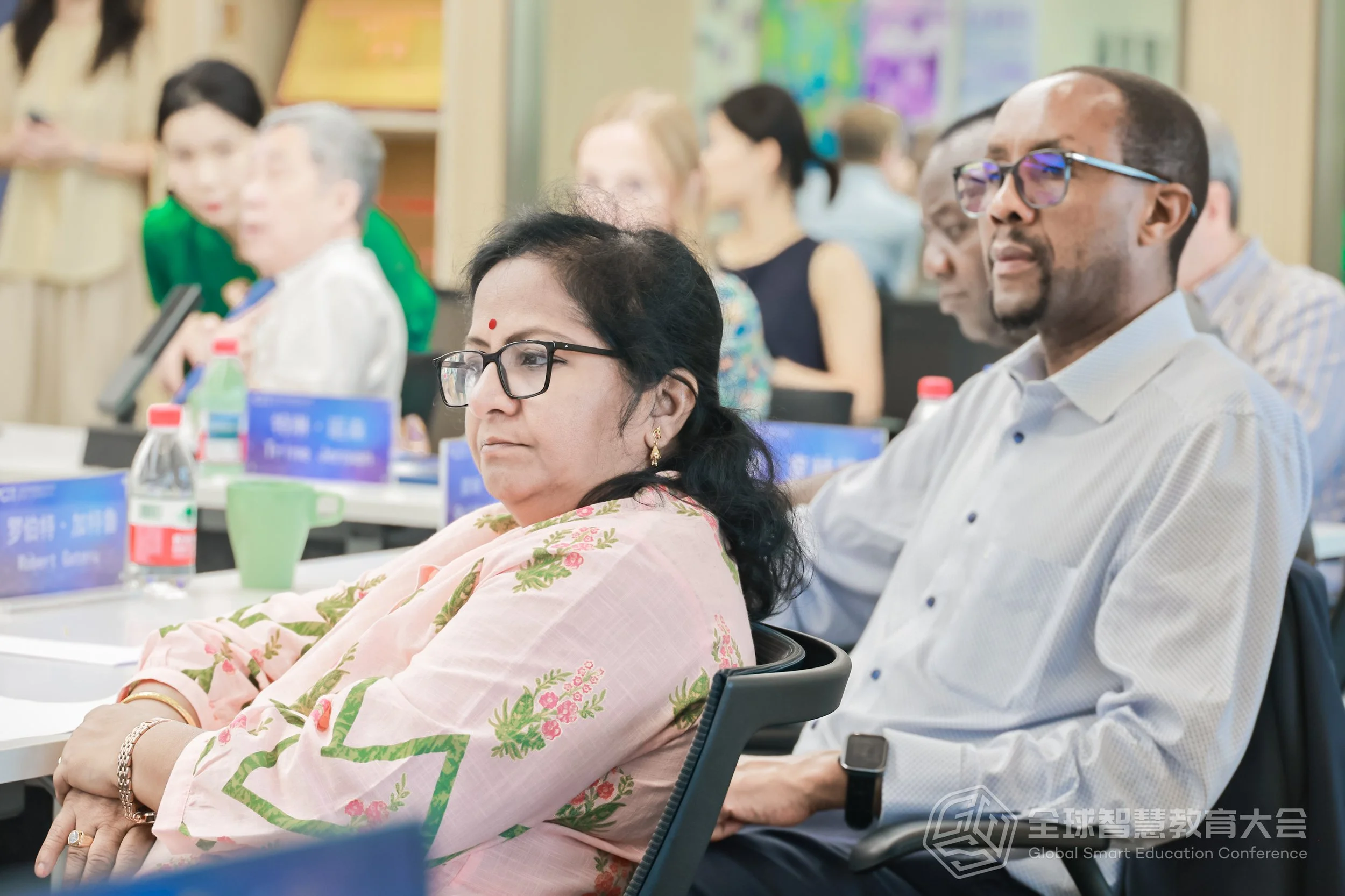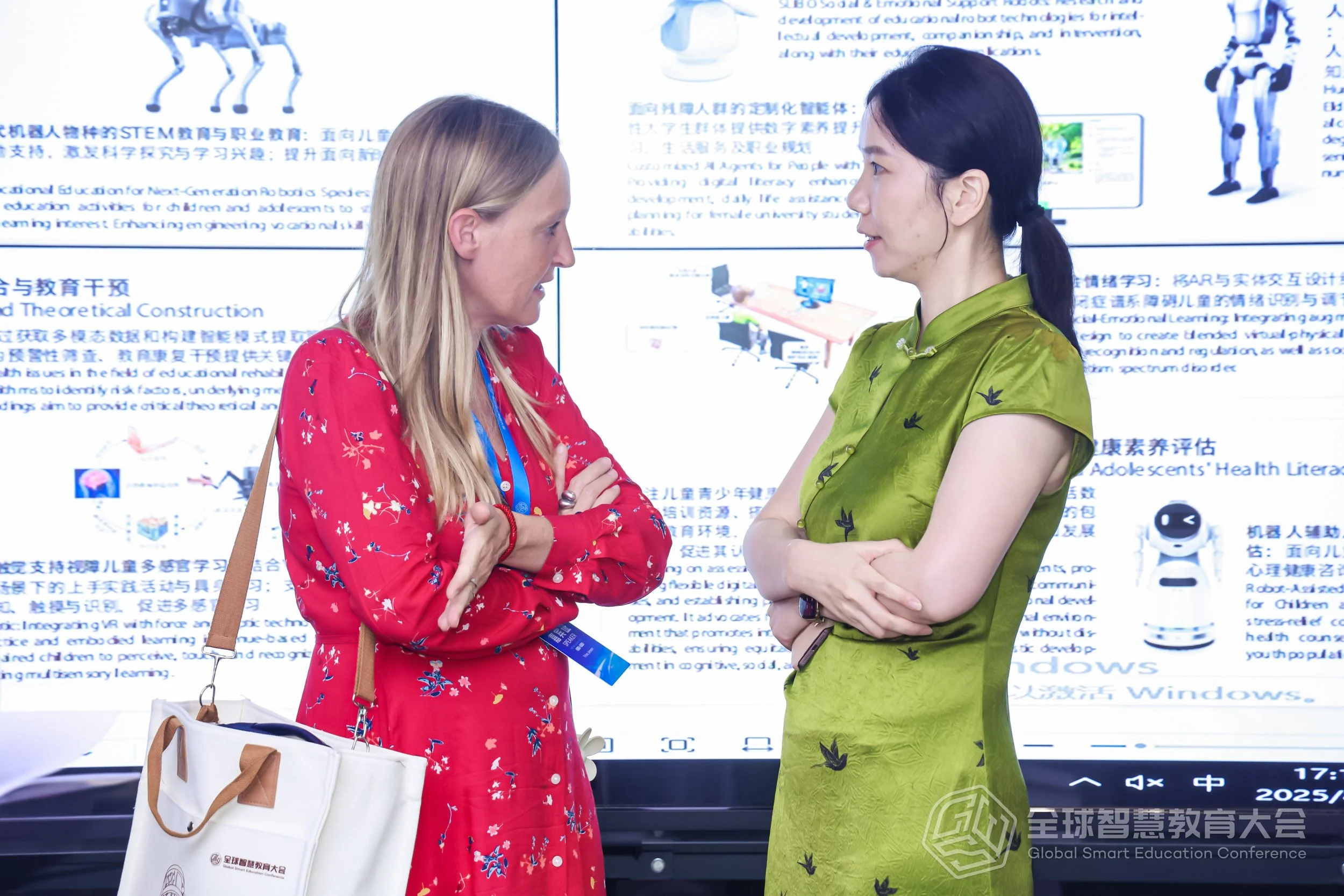Institutional Site Visit on Artificial Intelligence at BNU
BNU Hosts IAU Institutional Site Visit on Artificial Intelligence
Article prepared by BNU
From August 20 to 21, 2025, IAU Institutional Site Visit on Artificial Intelligence and the Global University Leaders Forum——Harnessing AI to Transform Higher Education was successfully held at the Changping and Haidian Campuses of Beijing Normal University (BNU). Leaders, experts, and scholars from 18 universities across 16 countries in Asia, Europe, Africa, and Oceania gathered in Beijing to engage in in-depth discussions on the transformation of higher education empowered by artificial intelligence and to examine relevant practical achievements. The Site Visit and the Forum was co-hosted by International Association of Universities (IAU) and UNESCO Chair on Artificial Intelligence in Education, Beijing Normal University, which marked the first implementation of the “IAU Institutional Site Visit” program in China and also the flagship cooperative initiative following Beijing Normal University’s official accession to IAU.
Group Photo of Global University Presidents at Beijing Normal University
The International Association of Universities (IAU), established in 1950 at the initiative of UNESCO, is one of the most influential international organizations in the field of higher education. Today, it brings together nearly 600 member universities and institutions across more than 120 countries. The Association has long been dedicated to fostering international cooperation in higher education, advancing capacity building, promoting digital transformation, and supporting sustainable development as a means to address global challenges. In 2022, the International Association of Universities (IAU) identified “Higher Education and Digital Transformation” as one of the four strategic priority areas in its IAU 2030 Agenda. Within this framework, particular emphasis has been placed on the profound implications of artificial intelligence for higher education especially concerning ethics, governance, and the reshaping of teaching and learning models. The International Association of Universities (IAU) advocates for the development of an ethically grounded, equitable, and inclusive pathway for intelligent education. In response to the challenges posed by generative AI, the Association actively promotes collaborative exploration among its member universities. Through initiatives such as global institutional visits, it seeks to identify solutions that are both replaceable and scalable, thereby contributing to sustainable and responsible innovation in higher education worldwide.
Professor Huang Ronghuai at the IAU 2024 International Conference in Tokyo, Japan
The UNESCO Chair on AI in Education has maintained close collaboration with the International Association of Universities (IAU). In May 2024, Huang Ronghuai, Dean, Smart Learning Institute of Beijing Normal University, UNESCO Chair on AI in Education was invited to contribute a feature article to IAU Horizons, the official publication of IAU, where he explored the pathways for reshaping higher education in the era of intelligence. Later, in November, Professor Huang attended the International Association of Universities (IAU) Annual Conference in Tokyo, Japan, where he delivered a keynote speech on the profound impact of generative artificial intelligence on higher education. In December, he visited the IAU headquarters in Paris and advanced a consensus to co-host a global seminar and study visit on artificial intelligence in education at Beijing Normal University.
These in-depth exchanges laid a solid foundation for Beijing Normal University’s official admission into the International Association of Universities (IAU) in March 2025 and directly facilitated the visit of the global delegation of university presidents. The delegation placed particular emphasis on Beijing Normal University’s development in AI and education, aiming to foster deeper cooperation that integrates international experience with Chinese approaches for mutual innovation.
At the opening day, Liu Yongqiang, Director, Division of Curricula, Teaching Materials and Laboratories, Department of Higher Education, Ministry of Education (China), Chen Xing, Vice President of Beijing Normal University and Huang Ronghuai, Dean, Smart Learning Institute of Beijing Normal University, UNESCO Chair on AI in Education, welcomed the delegation members.
As a representative of Chinese higher education, Beijing Normal University (BNU) has, in recent years, advanced the deep integration of artificial intelligence with education and teaching. During the exchange, Li Xin, Deputy Director, Provost's Office and Academic Affairs, Beijing Normal University, emphasized that the university has been fully implementing China’s national strategy of integrating education, science and technology, and talent development, positioning artificial intelligence as a new engine for promoting high-quality educational progress. To this end, BNU has systematically developed an exploratory framework built around four major pillars.
The first, AI for Discipline, focuses on strengthening academic development by establishing an undergraduate program in AI and Education, as well as interdisciplinary dual-degree and micro-major programs to cultivate innovative and cross-disciplinary talent. The second, AI for Teaching and Learning, is advanced through the 1228 Initiative, which prioritizes the development of smart courses, digital textbooks, and intelligent teaching assistant platforms while promoting the application of knowledge graphs, personalized learning, and AI-supported classroom assessment. The third, AI for Science, leverages BNU’s independently developed Taiyan large language model to establish interdisciplinary research platforms and create a “super research assistant,” thereby driving paradigm innovation in both education and scientific inquiry. The fourth, AI for Education, aligns with China’s national education strategies by actively participating in the World Digital Education Alliance, fostering global cooperation, exchange, and the sharing of high-quality educational resources.
Li Xin emphasized that Beijing Normal University (BNU) will continue to leverage its unique strengths at the intersection of education and artificial intelligence, striving to develop an “AI + Education” model that embodies Chinese characteristics and can be shared and replicated more broadly. Since 2024, BNU has launched a three-year special initiative on “AI + Higher Launch Ceremony of Beijing Normal University’s “1228 Initiative” Education” teaching reform, known as the 1228 Initiative. The plan focuses on integrating AI into talent cultivation across ten academic programs, supporting twenty key teams dedicated to AI-enabled teaching and learning, developing twenty digital textbooks, and building eighty smart courses deeply embedded with AI applications. To date, fifty-six smart courses have been developed. Built upon knowledge graphs, these courses allow faculty to track data on course implementation, including the use of knowledge graphs and AI teaching assistants, thereby providing robust data support for the continuous improvement of teaching effectiveness.
In recent years, China’s Ministry of Education has continued to promote the collection and selection of exemplary cases of “AI + Higher Education” applications. The initiative aims to accelerate the deep integration of artificial intelligence into higher education, fostering innovation in talent cultivation models, advancing teaching reforms, and enhancing educational governance capacity. Following submissions from universities and expert reviews, the Ministry has released 50 benchmark cases in two batches, covering scenarios such as intelligent teaching, virtual simulation, knowledge graphs, and academic early-warning systems. These include frontier explorations such as “large model + curriculum” practices at leading institutions like Peking Liu Yongqiang, Director, Division of Curricula, Teaching Materials and Laboratories, Department of Higher Education, Ministry of Education (China),delivered a speech , delivered a speech University and Tsinghua University, as well as innovative applications such as smart laboratories, AI teaching assistants, and virtual simulation platforms.
Among them, Beijing Normal University’s case “Innovating AI+ Classroom Intelligent Assessment” was selected as one of the first batches of exemplary cases, showcasing the university’s pioneering practices in intelligent classroom evaluation and AI-enabled teaching reform. These cases highlight innovation, scalability, and demonstrative value, bridging the full chain of teaching–learning–management–assessment. They are accelerating the transformation of educational models from knowledge transmission to competency cultivation and human–machine collaboration, providing valuable models and pathways for Chinese universities in exploring AI-driven educational reform.
Liu Yongqiang, Director, Division of Curricula, Teaching Materials and Laboratories, Department of Higher Education, Ministry of Education (China), emphasized that the Chinese government attaches great importance to the deep integration of artificial intelligence and education. At present, Chinese universities are actively exploring curriculum development, textbook innovation, laboratory construction, and the establishment of intelligent learning platforms. Local education authorities, drawing on their own conditions, are also piloting demonstration projects to drive innovation in education governance and service models. Looking ahead, he noted, it is essential to build on new stages, new standards, and new pathways to promote systemic and profound educational transformation, accelerating the creation of a more resilient and sustainable ecosystem for the future of higher education.
During the Global University Leaders Forum — Harnessing AI to Transform Higher Education, Chen Guangju, Former Vice President of Beijing Normal University, delivered a welcoming address to leaders and guests from universities worldwide. He introduced BNU’s “one body, two wings” development framework, which centers on its strengths as a comprehensive, research-oriented, and teacher education–leading institution. He highlighted the university’s efforts in advancing digital transformation, upgrading intelligent systems, and building international cooperation networks to actively address the new opportunities and challenges faced by higher education.
Following this, several experts shared their perspectives and experiences. Zhang Jingjing, Associate Dean, Faculty of Education; Kuai Hongyan, Director, Design and Learning Lab, Smart Learning Institute and Ahmed Tilili, Deputy Director of Lab of AI Governance and Planning in Education, Beijing Normal University, presented insights into research, practice, and International principals shared insights and experiences on issues of mutual concern international collaboration in AI and education, providing the delegation with multidimensional learning and valuable reference points.
During the visit, the delegation focused on exploring Beijing Normal University’s Smart Classroom and Online Education Resource Center, gaining first-hand experience of the intelligent teaching environment and the wealth of digital learning resources. They also toured the Lab for Large-Model Adaptive Assessment and Intelligent Applications, as well as the International Lab on Artificial Intelligence and Youth Health, where they actively engaged with the wide-ranging applications of AI in experimental exploration and innovative practice. In addition, the delegation visited the Student Activity Center and the University History Museum, gaining a comprehensive understanding of BNU’s efforts in campus culture development and historical heritage. At the Smart Canteen, they enjoyed a seamless “contactless payment” lunch. The two-day immersive program provided a well-rounded showcase of Beijing Normal University’s achievements and experience in building a comprehensive smart education ecosystem.
At the closing ceremony, Trine Jensen, Manager, HE & Digital Transformation, Publication and Events International Association of Universities, spoke highly of the event. She noted that through on-site visits and in-depth discussions, education leaders gained valuable insights into Beijing Normal University’s systematic approach and innovative achievements in the field of AI in education. She emphasized that the “1228 Initiative,” along with China’s exemplary cases and innovative applications, provides a replicable “Chinese solution” for universities worldwide.
Jensen also expressed her sincere gratitude for the warm hospitality of Beijing Normal University and looked forward to deepening cooperation with the university. She highlighted the potential for advancing exchanges and partnerships in areas such as AI-driven educational research, talent cultivation, and case sharing, with the shared goal of contributing wisdom and strength to the future development of global higher education.
Looking ahead, the International Association of Universities will continue to deepen its cooperation with Beijing Normal University and the UNESCO Chair on Artificial Intelligence in Education. Together, they will work in key areas such as large-scale social experiments in AI and education, the promotion of exemplary cases and standards, and high-level forum exchanges. Through these joint efforts, they aim to enable universities worldwide to embrace the AI-driven transformation and to co-create a new chapter in the innovative development of higher education.
In his concluding remarks, “Digital Lao Huang”(Professor Huang Ronghuai’s digital twin ) reflected on the achievements of the two-day visit and exchanges. He emphasized that, looking to the future, higher education must proactively respond to ongoing transformations by strengthening AI literacy education and enhancing the ability of both faculty and students to understand and apply emerging technologies.
Prof Huang Ronghuai further highlighted the need to deepen cross-national research collaboration and to foster synergy among academia, Professor Huang Ronghuai delivered the closing remarks The delegation watching summary video at the closing industry, and policymakers in building an open and shared knowledge ecosystem. Professor Huang stressed that universities worldwide should work hand in hand to conduct large-scale educational social experiments and international exchanges, jointly exploring innovative models and practical pathways for the future of education.

